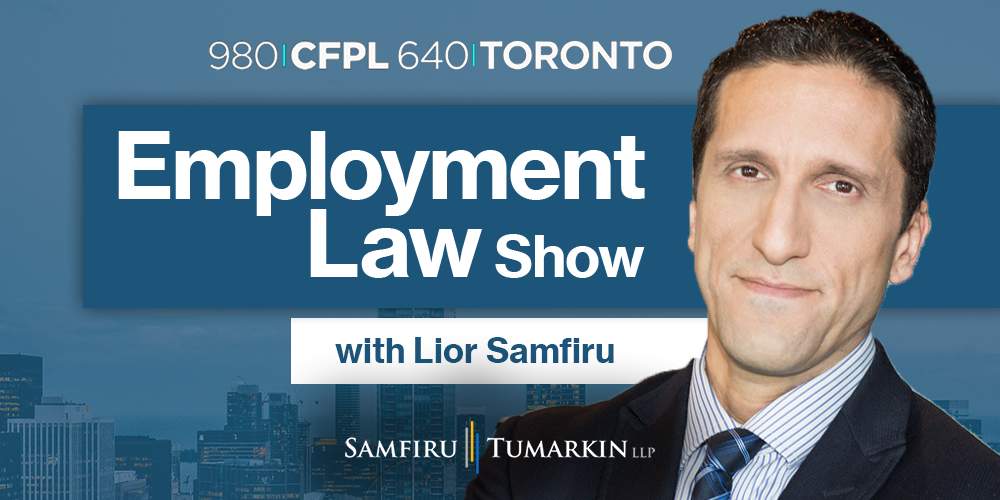Employment Law Show 640 Toronto – S9 E76

Episode Summary
What employees should not do, constructive dismissals, mandatory vaccinations, and more on Season 9 Episode 76 of the Employment Law Show on Global News Radio 640 Toronto.
Listen below as an employment lawyer at Samfiru Tumarkin LLP, reveals your workplace rights in Toronto and the GTA on the Employment Law Show. He shatters myths and misconceptions about severance pay, terminations, workplace harassment, overtime pay, wrongful dismissal, constructive dismissal, duty to accommodate, independent contractors, and more.
Listen to the Episode
Episode Notes
Employees who have been told their pay and hours will be reduced do not have to accept new terms.
Employers do not have the ability to implement fundamental changes to the terms of employment without an employee’s consent despite the pandemic. Employees who are willing to accept changes temporarily should communicate in writing with their employer when they expect the changes to revert back to normal. Changes made without an employee’s consent can lead to constructive dismissal.
Employees should never make assumptions about their employment rights.
Many employees are unaware of their rights and can incorrectly seek out misinformation or from the wrong sources. If an employee is unaware of their rights in a particular situation they should seek out advice from an employment lawyer.
Employees should not call the Ministry of Labour if they lose their job.
The Ministry of Labour can only instruct employees on their minimum severance entitlements upon termination and not their full entitlements. Employees who have been terminated should seek an employment lawyer for advice before agreeing to a severance offer.
LEARN MORE
Severance Pay in Ontario
Employees should not accept an unfair performance review.
Employees who feel a performance review from their employer is inaccurate should communicate their concerns with the review in writing. Employers often use performance reviews as proof to later terminate an employee for cause. Employees should follow recommendations from their employer but communicate that they do not accept the review.
Employees should not sign an employment contract before properly reviewing it.
Employees at the start of employment are often given a contract and sign without much review of the agreement. It is important for employees to review the agreement and look at terms such as termination clauses that could limit their future entitlements and rights. Employees who receive an employment contract after already starting employment should be wary of this agreement and contact an employment lawyer. New employment agreements are only enforceable if in exchange for signing the agreement an employee receives something in return.
When should an employer take measures to deal with a problematic employee?
Employers should investigate the degree of the problem and the full measure of the employee’s behaviour as objectively as possible. Employers should discipline an employee in a measure that is comparable to the level of misconduct. It is important to give employee warnings and document all incidents.
What advice should employees heed in regards to mandatory vaccines?
There are certain industries in which the government has imposed mandatory vaccines for employees. Employees who work in a business that does not have mandatory vaccines imposed by the government do not have to be vaccinated. Some sectors are considered high-risk and require employees to be vaccinated or undergo testing.
Learn More
How to respond if your boss pressures you to get vaccinated
Are employers obligated to offer an alternative to mandatory vaccines?
For non-unionized employees and employers, other measures such as rapid testing and possible remote working could be implemented for the workplace instead of vaccination. This situation will depend on the business sector and what has been instructed by the government.
My wife was an employee and manager for almost 3 decades. She was offered a contract a few months ago but she refused to sign it and it had a non-compete clause. What can she do?
Employees who have not signed a contract that had a non-competition clause and non-solicitation clause are not beholden to those terms. Employees in managerial positions, however, should be wary of pursuing direct competition to their former employers as they were senior-level employees if they use former information in their future employment.




